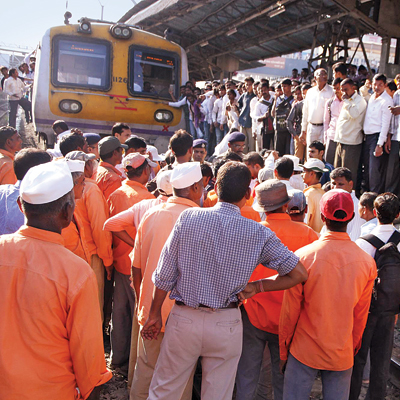Trackman run over by train between Thane and Mulund
Tuesday, 16 December 2014 - 5:45am IST
| Agency: dna
-
 Hundreds of irate railway workers at the Thane station
resorted to a spontaneous rail blockade agitation on Monday, hours after
the death of a gangman on the tracks
Hundreds of irate railway workers at the Thane station
resorted to a spontaneous rail blockade agitation on Monday, hours after
the death of a gangman on the tracks
Mahadev Swami, a blacksmith, working on the tracks, was mowed down by a train running between Thane and Mulund on the slow track. The incident took place at 2:10pm. Swami's death led to an impromptu protest by several of his colleagues, who walked on the tracks and shouted slogans at Thane station.
Central Railway officials said no trains had been delayed because of the protest, and repercussions on train traffic, if any, was because of the 15 minutes it took to take Swami's body by train to Thane.
Speaking to dna, Mukesh Nigam, divisional railway manager, CR, said: "It's an unfortunate incident. He was one of us. His kin will be given compensation and all other facilities (they are entitled to). An inquiry has been instituted to find out what caused the incident."
Railway employees told this paper that erratic maintenance schedules had been creating dangerous work conditions for front-line staff like Swami. "Due to the high number of trains and the general decline in standard of the (suburban) system, maintenance has to be undertaken even beyond the mega-block period. This creates a dangerous situation as trackmen have to work even as trains go past them (on all four lines). Sometimes it's a recipe for disaster," said a gangmen.
The accident has also given a fillip to the demand of railway unions that those working in railways be given special status, like those in the defence forces, when it comes to deciding their pay structure. Unions had raised this demand when they met officials of the 7th Pay Commission early November in Mumbai.
At the meeting, Western Railway Mazdoor Sangh had furnished statistics that showed that the number of deaths and injuries in the line of duty among railwaymen was second only to the defence forces. WRMS functionaries had pointed out that between 2007 and 2011, the number of railwaymen killed on duty stood at 1,600, and 9,000 had been injured; many had been crippled for life.
A dangerous job
On November 1, dna front-paged an article on how Central Railway train examiner MA Shaikh had died while trying to rectify an electrical fault in a Bandra-CST local. Shaikh, called in to look into the malfunctioning of a train early morning on October 31, fell and had his legs severed when he leaned out of the running train to check if the overhead apparatus was working. The incident occurred close to Dockyard station. Shaikh's colleagues had then told dna that such risks were part and parcel of the job. Gangmen and pointsmen who walk along the tracks looking for and rectifying faults, remain the most vulnerable with the number of deaths among them being among the highest.



.jpg)
.jpg)



0 comments:
Post a Comment